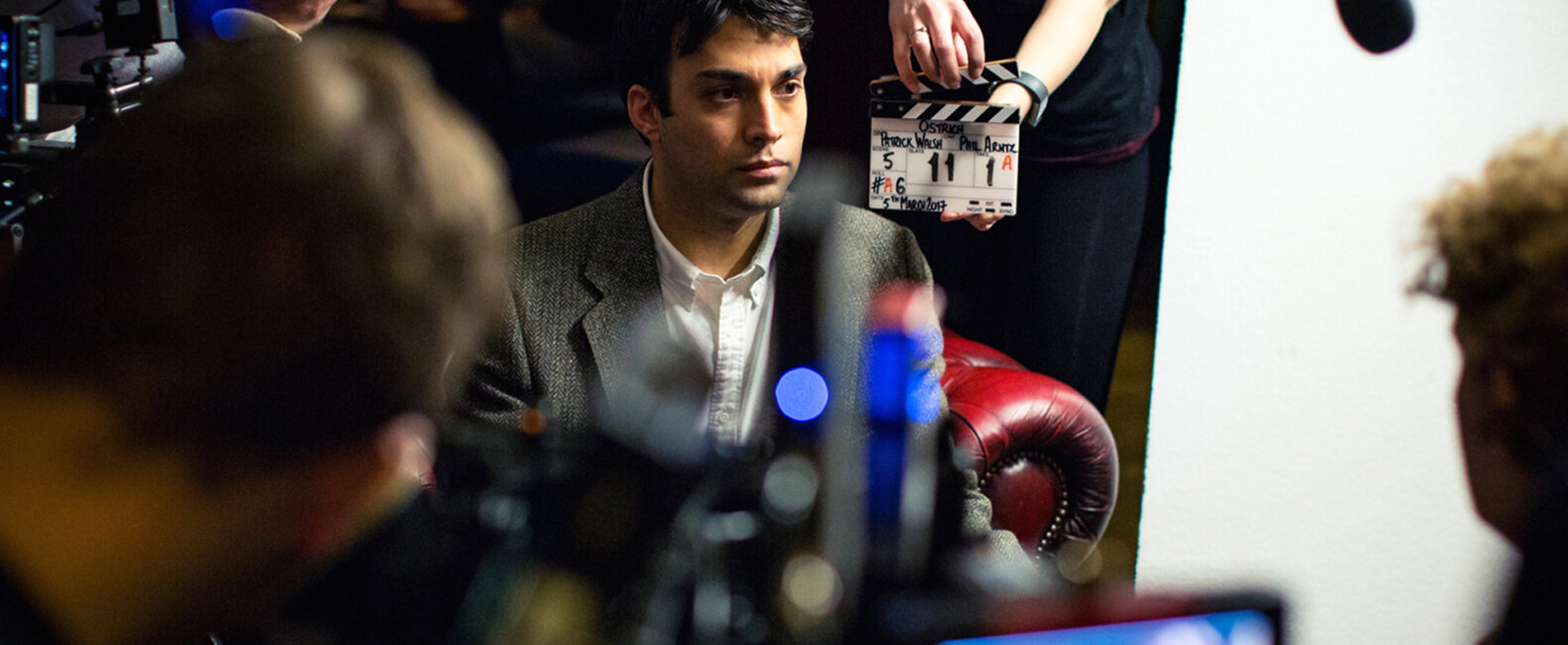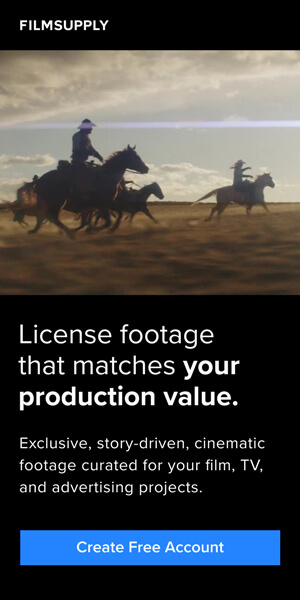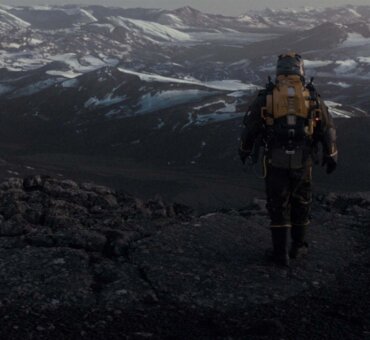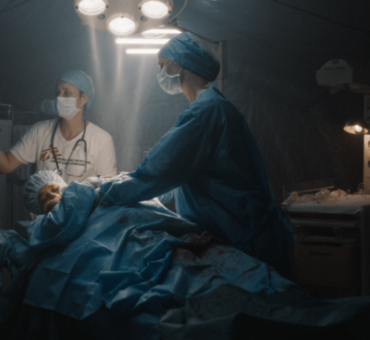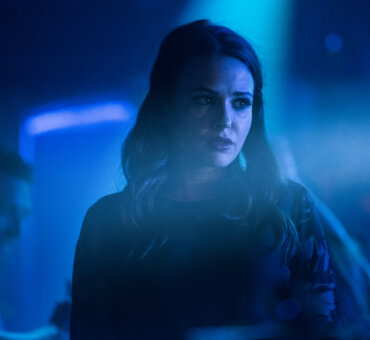Taking on your directorial debut is a daunting process, especially when that debut is a dialog-heavy, nuanced political thriller. So it’d make sense that editor-turned-director Patrick Walsh needed a little liquid courage before he announced to a bar full of filmmakers that he had a script, or at least one in his head.
“I didn’t have a script [laughs]…I drunkenly forced myself into putting pen to paper. It really started out like that,” Patrick told us.
This somewhat off-the-cuff inception resulted in Ostrich, one of the most efficiently told, striking narratives we’ve seen — and our next entry into Filmsupply Films. Patrick (an editor at The Quarry, a prestigious London editing house) and the film’s production company Visual Goods pulled off a filmmaking miracle, transforming a complicated subject into 15 minutes of tightly wound, dramatic tension. It’s hard enough to make a good film, much less an exciting film that’s literally a single conversation between two people. Ostrich is exactly that.
Read our conversation with Patrick and Producer Elisabeth Hopper about developing the script, and how Patrick’s editorial background was a huge advantage for the production.
Filmsupply: How did you get this film off the ground?
Patrick Walsh: I edited a short film for James [Northcote] and Elisabeth [Hopper] a few years back, and we got on really well. After we got the picture lock, we ended up celebrating at a bar. I quite drunkenly blurted out that I had a script I’d written, and it’d be really cool if they’d read it. The next day, I remembered that conversation — and even though I kindly gave them a deadline, I didn’t have a script. [Laughs] At that point, I knew I had to follow through if I was ever going to work with them again.
That’s one way to do it.
Patrick: I drunkenly forced myself into putting pen to paper. It really started out like that.
Was there an idea you were sitting on that just needed to come out?
Patrick: I think so. It was the kick in the ass that I needed. In my head, I always saw myself as more of the writer/director type even though editing is my full-time job. This was the thing that forced me into action. I’ve always wanted to make a political thriller.
Why a political thriller, specifically?
I’ve always been a fan of Alan Pakula’s films, Klute, All The President’s Men, things like that, and there have been all sorts of political upheavals in recent years. I didn’t want to focus on anything too specific, but I thought the time was right for an old-school, ‘70s-style political thriller to be relevant again. I had an idea of what it would look like, with all sorts of things bubbling around in the back of my mind. I also knew it had to be practical, so we decided to keep it to two people, just talking in a room. It took about two months to write the initial script, and I was really happy with it. I gave it to James and Elisabeth, thinking, Right, it’s ready. We can start. They said, “Yeah, it isn’t bad, but we should really start working on it now.” [Laughs]
That’s where James and Elisabeth’s creative skills really flowered because they turned this really rough stone into a polished script over the course of a year. It went from a bit of a flabby, bleeding heart, gas-bag script to a much sharper-toned, fully-formed thing.
What did that process look like?
Elisabeth Hopper: It wasn’t necessarily a point of changing the direction of the script. Pat’s imagination is so massive that it was more about getting it down to something you could fit into a 10- to 15-minute short film. That’s mainly what we worked on. We worked on character development. Why are these two people meeting? What’s the reason behind their conversation? It was more about focusing Pat’s energies onto one particular path. I think he’s being really modest, because it was more about needing to make a film that was 12 minutes, not six hours.
Do producers normally have that much influence on a script?
Elisabeth: It’s unique to this production. James and I come from a creative background and we’re used to working with scripts and it felt really natural. But, no, it’s not normally the job of the producer. You’d normally get a script editor. In our case it was an unorthodox route, but it really worked well and meant there weren’t too many cooks in the kitchen.
How did you narrow things down to the final script?
Elisabeth: When you have brilliant material to go with, you just start by asking questions. If I’m sitting in an audience, what am I going to care about the most? What makes the most sense? Are there things that are going to confuse people? What’s accessible?
Patrick: It really helped to sit down and do a read-through with the actors. It was really easy for me to type and type and type, and have imaginary people sound really clever. It’s different when people have to say the words out loud. When we got to that point, I think it was really clear what was interesting and what wasn’t. Actually hearing actors read things made it clear what were the strongest bits, the key elements — not only that were interesting or relevant, but also revealed things about characters. It was obvious to me what should stay and what should go. That’s when my background as an editor really came into play.
How so?
Patrick: On-set, I realized this is where seven years as an editor is really going to pay off. We had, essentially, a day of prep on-location to figure out where we were going to put actors, extras, and where we were going to place the cameras. Even though the film is dialog-heavy, there was still a lot of setup. Being on-set, looking around, I realized I could be quite ruthless with what we needed. We didn’t need wide coverage from 50 different angles. I could be quite specific because I was piecing it together in my head from a visual point of view, as I had been doing as an editor for years.
It helped in the initial prep phase and while we were shooting. It was a no-brainer to me when we’d gotten a certain shot, and I could say, “We can move on, and save a lot of time here. We don’t need five different introductions from five different angles.” The first AD really appreciated that.
Elisabeth: From a production standpoint, we wanted to make sure everything was as seamless as possible, especially being Pat’s directorial debut. You see a lot of stress on-set sometimes because people don’t know where they should be or what their role is. From Visual Goods’ standpoint, we tried to create an environment that was as transparent and supportive as possible. Pat was free to let his genius flag fly. It was really special watching him direct, because he’s so self-assured. He’s a natural director. Back to him saying that he drunkenly told us about this idea in the bar: I feel like we should take some credit for that. Yes, he drunkenly suggested it, but we damn-well made sure that he followed through with it. [Laughs]
Did your commercial background help the process?
Patrick: With Quarry, I’ve had the chance to work on commercial projects with huge directors like Jonathan Glazer (Under The Skin, Sexy Beast), Tom Hooper (The King’s Speech, Les Miserables), Ruben Fleischer (Zombieland), Carl Rinsch (47 Ronin), and many, many others, so it’s been impossible not to have learnt a lot about practically every aspect of the filmmaking process.
It’s been fascinating to see how they keep on top of the bigger picture throughout the entire process, from shot-selection in the edit, to VFX considerations, to sound design, and grading. There’s not a single aspect of working in commercials that hasn’t been transferable to narrative film, both as an editor and now as a director. Editing at The Quarry has been the most practical, real-world preparatory education in audio-visual storytelling I can imagine.
Why did you decide to start with fiction instead of non-fiction?
Patrick: To me a compelling story takes from what we’ve got to work with in real life, but I wanted to delve into realistic political upheaval without having to do a docudrama. I wanted the story to be intertwined with the characters. Even though it crescendos to a melodramatic ending, the subject matter is depressingly, surprisingly, real-world. Using fictionalized characters to live and breathe in that world helps bring attention to it. The subject can get boring very easily, so injecting these Machiavellian characters seemed to be a good way to explore the subject matter.
Elisabeth: It’s that intrigue, isn’t it? What goes on behind closed doors. You get a glimpse into where these characters have been and what led them to where they are now.
There seems to be a universal thrill in calling someone out.
Elisabeth: Yeah, finally someone’s done it!
Well, until the ending. How did you decide on that?
Patrick: For a short film, you’ve got to finish with a crescendo and give people something to remember you by. That twist, that dark turn, is something I knew we needed to reach. However satisfying it is to see a journalist take down a politician, the further twist, to me, makes the ending more entertaining. I think we pulled if off nicely.
Elisabeth: I didn’t want anyone to leave the cinema feeling safe. You don’t want to get to a resolve where the good guy wins, because, I think, the majority of time reality is not like that. Keep people thinking; keep them guessing. It shows there’s so much more to this world.
It did hint at a much larger universe.
Elisabeth: You’re right. It’s very much the tip of the iceberg. We have a joke that Pat is going to write something like Star Wars. What did you call it?
Patrick: Oh god, like a cinematic universe.
Elisabeth: Yeah, an Ostrich cinematic universe. [Laughs]
Patrick: It started with the intention of being a film that was very manageable. Could we shoot this on iPhones in a dark room and it still have the same dramatic and narrative weight? We got super lucky that we wrangled enough talented people — like our DP Phil Arntz — to make it seem so much bigger and more cinematic. Lots of people, coming out of the screenings, said that wanted to see more of this world and the characters. It’s nice that we could incorporate, however minimally, in the background of this conversation the notion that they’re part of this much larger world. It goes back to the old idea that people like Steven Soderbergh go on about: You want to get in at the latest point possible and leave at the earliest point possible. I think that’s what great storytelling is about: the leanest, meanest version of the story that you can tell.
To watch more incredible short films from Filmsupply Filmmakers, head over to filmsupply.com/films.
